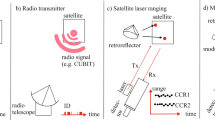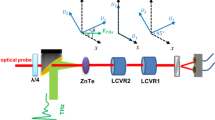Abstract
IN a recent communication1, Prof. S. R. Khastgir has illustrated a complex type of trace obtained with a twin-channel cathode-ray direction-finder when receiving atmospherics. He has claimed to have deduced from this record information regarding the polarization of the echoes received after various numbers of reflexions between the Earth and the ionosphere. I believe that the record which he gives as an example can be explained almost completely by the combination of a ground-wave and the echo received after only one ionospheric reflexion.
This is a preview of subscription content, access via your institution
Access options
Subscribe to this journal
Receive 51 print issues and online access
$199.00 per year
only $3.90 per issue
Buy this article
- Purchase on Springer Link
- Instant access to full article PDF
Prices may be subject to local taxes which are calculated during checkout
Similar content being viewed by others
References
Nature, 181, 404 (1958).
Adcock, F., and Clarke, C., J. Inst. Elect. Eng., 94, Pt. III, 118 (1947).
Author information
Authors and Affiliations
Rights and permissions
About this article
Cite this article
HORNER, F. Polarization of Atmospherics. Nature 181, 1678–1679 (1958). https://doi.org/10.1038/1811678b0
Issue Date:
DOI: https://doi.org/10.1038/1811678b0
Comments
By submitting a comment you agree to abide by our Terms and Community Guidelines. If you find something abusive or that does not comply with our terms or guidelines please flag it as inappropriate.



